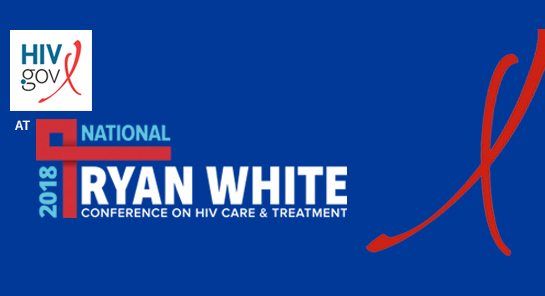Ryan White 2018: Clinical Conference Highlights
Cross-posted from TargetHIVExit Disclaimer

Well over 600 clinicians are attending the 2018 Clinical Conference at the National Ryan White Conference on HIV Care & TreatmentExit Disclaimer. This annual event has been around for nearly two decades and serves to reach and educate front-line HIV clinicians in the U.S. who deliver comprehensive HIV care to over half a million individuals under the HRSA HIV/AIDS Bureau's Ryan White HIV/AIDS Program (RWHAP).
All sessions are or will be online in webcast and slide formatExit Disclaimer. Subscribe to the newsletterExit Disclaimer of the AIDS Education and Training Centers (AETC) National Coordinating Resource Center (NCRC) to be notified when recordings are onlineExit Disclaimer.
Presentation Highlights
Below, Laura W. Cheever, MD, ScM, Associate Administrator of the HRSA HIV/AIDS Bureau, provides highlights on some of the 19 plenary lectures—each of which engages participants via rapid fire audience response polling questions.
Intersection of Interpersonal Violence and HIV
Fifty percent of women living with HIV have experienced interpersonal violence (IPV). Presenter Tami Sullivan, PhD, outlined the importance of addressing IPV as part of clinic work to improve patient health outcomes. Her talk focused on integrating screening into a busy HIV clinic and developing needed partnerships with domestic violence resources in the community. See The Intersection of Intimate Partner Violence and HIV: Detection, Disclosure, Implications for Treatment AdherenceExit Disclaimer [PDF, 1.2MB], Tami P. Sullivan, PhD.

HCV/HIV Co-Infection
HCV/HIV elimination is attainable nationally and worldwide. In his presentation, David L. Thomas, MD, MPH advised clinicians to look at where their clinics were on the hepatitis C (HCV) treatment cascade (i.e., how many people have been diagnosed, referred, treated and cured) as—much like the HIV treatment cascade—those who have yet to be cured of HCV may be more difficult to reach. This will necessitate new clinic strategies, like intensive case management. See Elimination of Hepatitis C in Individuals with HIV InfectionExit Disclaimer [PDF, 1.5MB], David Thomas, MD, MPH.
New Long Acting Antiretroviral Therapies
The next big thing is long-acting agents that, perhaps within the next year, may be available. Two are injectable therapies that can be given monthly. "That's a game changer," said Cheever, "not just for those having challenges taking pills but also those who want to be liberated from taking HIV medications daily." See Investigational Approaches to Antiretroviral Therapy: New Strategies and Novel AgentsExit Disclaimer [PDF, 1.6MB], Joseph J. Eron, Jr, MD, and Treating HIV in 2018–Interactive Cases From the Clinic(ians)Exit Disclaimer [PDF, 1.6MB], Michael S. Saag, MD.
PrEP
While there are potential new PrEP medications, clinicians and patients need to stay focused on Truvada until data verify the efficacy of other PrEP options. See Antiretrovirals for HIV Prevention: Optimizing the Use of PrEP and PEP in 2018Exit Disclaimer [PDF, 2.0MB], Raphael J. Landovitz, MD, MSc.
Sexually Transmitted Infections (STIs)
We are seeing a huge increased in STIs in the United States, which puts increased importance on screening and testing at oral, rectal and urethral sites in order to really make sure that gonorrhea and chlamydia are diagnosed and treated. Of particular importance is screening among MSM but also pregnant women given the increase in congenital syphilis. See Sexually Transmitted Infections: Gonorrhea, Chlamydia, Trichomoniasis, and Human Papillomavirus (HPV)Exit Disclaimer [PDF, 1.8MB], Kimberly A. Workowski, MD and The Great Imitator Revealed: SyphilisExit Disclaimer [PDF, 1.4MB], Jeffrey D. Klausner, MD, MPH.

Reaching Experienced and New HIV Clinicians
The Clinical Conference has traditionally been tailored for experienced HIV clinicians, said Donna Jacobsen, Executive Director of IAS-USA, a conference co-organizer. This year, about one-third of attendees reported having fewer than five years of HIV clinical experience, prompting a first-ever HIV 101 pre-conference for relative newcomers—perhaps testimony to the generational change in the HIV workforce and the need for more trained HIV cliniciansExit Disclaimer. Topics covered in the HIV 101 seriesExit Disclaimer included epidemiology and pathogenesis of HIV; application of antiretroviral therapy; and diagnosis and management of complications of HIV. "We will definitely repeat it in the future," said Cheever.
First Timer Perspectives
By 2030, viral hepatitis is projected to kill more people than HIV, malaria, and TB combined. That message, delivered in the Hepatitis Elimination plenary, landed with Janet McKissick, a South Carolina physician attending the Clinical Conference. HIV is part of McKissick's larger primary care practice. She sees 40 patients living with HIV at the Ryan White-funded Low Country Health Care Services, Inc.Exit Disclaimer to get their HIV care. Low Country is funded by Ryan White Part C and a HRSA Health Center located in rural Fairfax, South Carolina.
"The liver and syphilis talks" stood out for first time attendee Paul Chen, MD, of the MedStar Washington Hospital Center in the District of Columbia. "Great overviews" by "real experts in the field," said Chen, with insights on syphilis management approaches at different stages of infection and managing and recognizing potential negative outcomes in HIV/HCV co-infected individuals, like fatty liver disease and hepatitis super-infection when HIV suppressive drugs are withdrawn. See The Great Imitator Revealed: SyphilisExit Disclaimer [PDF, 1.4MB] (Jeffrey D. Klausner, MD, MPH) and Issues in Liver Health and Disease: Overview for the NonhepatologistExit Disclaimer [PDF, 1.5MB] (Kenneth E. Sherman, MD PhD).
McKissick came to the Clinical Conference to learn about treatment basics, like medication updates on new two-drug combinations. In our brief conversation with McKissick asked about how to line up one of her uninsured clients, who is soon to move out of the area, with a new Ryan White clinic. Our advice: use the HIV.gov service locator (RWHAP clinics are one of the categories of agencies listed) along with our Program LocatorExit Disclaimer.